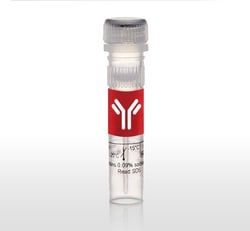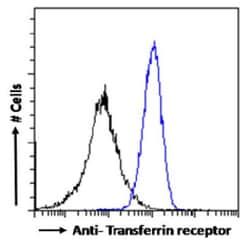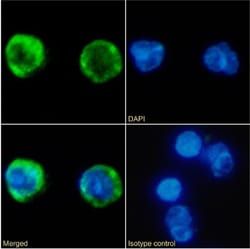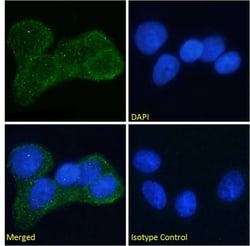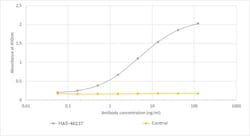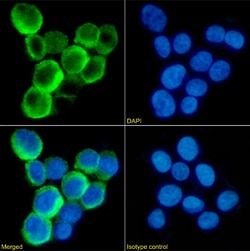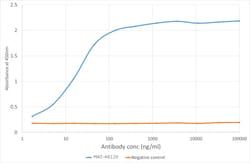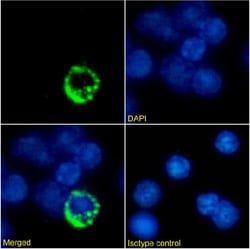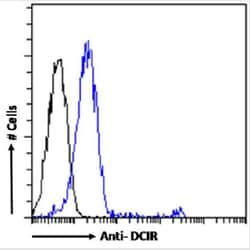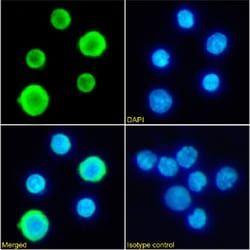TCR alpha/beta Chimeric Recombinant Rabbit Monoclonal Antibody (Desire-1), Invitrogen™
Manufacturer: Thermo Scientific
Select a Size
| Pack Size | SKU | Availability | Price |
|---|---|---|---|
| Each of 1 | PIMA548114-Each-of-1 | In Stock | ₹ 46,769.50 |
PIMA548114 - Each of 1
In Stock
Quantity
1
Base Price: ₹ 46,769.50
GST (18%): ₹ 8,418.51
Total Price: ₹ 55,188.01
Antigen
TCR alpha/beta Chimeric
Classification
Recombinant Monoclonal
Concentration
1 mg/mL
Formulation
PBS with 0.02% ProClin 300
Gene Accession No.
P01849
Gene Symbols
TCRA, Tcrb, TRAC
Immunogen
mAb desire-1 was obtained after fusion of spleen cells from a BALB.K mouse immunised twice with KB5-C20 clone cells in RPMI 1640 medium, with non-Ig-producing myeloma cells X63-Ag8.653.
Quantity
200 μg
Primary or Secondary
Primary
Target Species
Mouse
Form
Liquid
Applications
Flow Cytometry, Immunocytochemistry, Immunoprecipitation, In vitro Assay
Clone
Desire-1
Conjugate
Unconjugated
Gene
TCRA
Gene Alias
FLJ22602; IMD7; LOC290071; MGC117436; MGC22624; MGC23964; MGC71411; RATTCB; RATTCBC1; RGD1359684; similar to RIKEN cDNA A430107P09 gene; T cell receptor beta locus; T3/TCR complex; TCB; TCBC1; t-cell antigen receptor; T-cell receptor alpha constant; T-cell receptor beta chain; T-cell receptor V alpha; tcr alpha; TCR alpha/ beta; TCR beta; TCRA; Tcrb; TRA; Tra29; TRAC; TRB; TRB@; TRCA
Host Species
Rabbit
Purification Method
Affinity chromatography
Regulatory Status
RUO
Gene ID (Entrez)
100101484, 21473, 21577
Content And Storage
Store at 4°C short term. For long term storage, store at -20°C, avoiding freeze/thaw cycles.
Isotype
IgG κ
Description
- Specificity: mAb desire-1 recognises an epitope contributed by both the alpha and beta chains of the KB5-C20 TCR
- Preparation: mAb desire-1 was obtained after fusion of spleen cells from a BALB.K mouse immunised twice with KB5-C20 clone cells in RPMI 1640 medium, with non-Ig-producing myeloma cells X63-Ag8.653
- Desire-1 was selected for its capacity to inhibit selectively the H-2Kb-specific cytolysis by clone KB5-C20
- The T cell antigen receptor (TCR) consists of a ligand-specific alpha/beta heterodimer non-covalently associated with five invariant chains including the CD3 gamma/delta/eta and zeta subunits, all of which are required for efficient surface expression
- T cell activation through the TCR induces cellular differentiation and/or proliferation and the production of lymphokines and cytokines
- Both the CD3 and TCR zeta subunits are proposed to be responsible for the intracellular signal transduction events
- Majority of T cells present in the blood, lymph and secondary lymphoid organs express TCR alpha/beta heterodimers, whereas the T cells expressing TCR gamma/delta heterodimers are localized mainly in epithelial tissues and at the sites of infection
- The subunits of TCR heterodimers are covalently bonded and associate with the CD3 subunits in the endoplasmic reticulum to form functional TCR-CD3 complex
- Lack of expression of any of the chains is sufficient to stop cell surface expression
- The ability of T cell receptors (TCR) to discriminate foreign from self-peptides presented by major histocompatibility complex (MHC) class II molecules is essential for an effective adaptive immune response
- TCR recognition of self-peptides has been linked to autoimmune disease
- Mutant self-peptides have been associated with tumors
- Engagement of TCRs by a family of bacterial toxins know as superantigens has been responsible for toxic shock syndrome
- Autoantibodies to V beta segments of T cell receptors have been isolated from patients with rheumatoid arthritis (RA) and systemic lupus erythematosus (SLE)
- The autoantibodies block TH1-mediated inflammatory auto-destructive reactions and are believed to be a method by which the immune system compensates for disease (ref5)
- T Cell and TCR Diversity Most human T cells express the TCR alpha-beta and either CD4 or CD8 molecule (single positive, SP)
- A small number of T cells lack both CD4 and CD8 (double negative, DN)
- Increased percentages of alpha-beta DN T cells have been identified in some autoimmune and immunodeficiency disorders
- Gamma-delta T cells are primarily found within the epithelium
- They show less TCR diversity and recognize antigens differently than alpha-beta T cells
- Subsets of gamma-delta T cells have shown antitumor and immunoregulatory activity.
